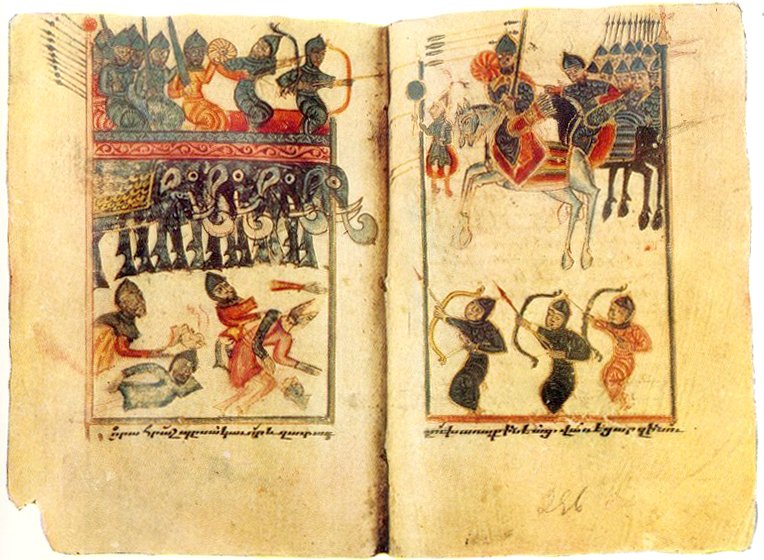
May 26, 451 A.D., is one of the most glorious dates in the history of the Armenian people. It is the date of the Battle of Avarayr, which took place in the Plain of Shavarshan (modern Maku, in the northwestern corner of Iran) along the banks of Dghmud (a tributary of the River Arax), when 1,036 Armenian soldiers, together with their commander Vartan Mamigonian, died in defense of their faith and freedom. The battle involved 66,000 Armenian soldiers against the 300,000-member Persian army and was a military disaster for the Armenian nation. Armenians lost militarily, and their hero, Vartan the Brave, was killed.
The battle was lost, but not the war! Over the next 33 years, brave and bold Armenian souls took refuge in the hills, as they struggled to organize an effective defense of their homeland and secure the right to religious freedom and cultural and political autonomy.
Eventually, Vahan Mamigonian, the son of Vartan’s brother Hmayak, successfully led and won a guerrilla war against the Persians. Thereupon, the Persians signed a treaty with the Armenians in 484 – the famous Treaty of Nvarsak – whereby the Persian King Vagharsh granted Armenians religious freedom and cultural autonomy.
The fifth-century heroic struggle of the Armenian nation came to be called the Vartanantz War, in honor of the main hero, Vartan Mamigonian. During the Middle Ages, Armenia’s church fathers moved the observance of the Vartanantz War from May 26 to the Thursday preceding Lent. Vartan’s comrades – those who shared his profound faith in God and demonstrated loyalty to his cherished causes – came to be called Vartanank.
The crisis that developed and culminated in the armed confrontation known as the Vartanantz War began in the late 440s, when King Yazdegerd II of Persia (438-457), a fanatical Zoroastrian monarch, ordered all the subjects of his empire to adhere to his faith. The majority of the Armenian people were directly affected by Yazdegerd’s royal edict, since a large section of Armenia was under Persian control after the unfortunate partition of Armenia by the Byzantine and Persian empires in 387 A.D.
I believe we can honor these heroes if we live by the principles, values and causes for which they died. We can honor them if we hear their message, take it to heart and apply it to our lives.
The official reply of the Armenian people to Yazdegerd’s edict was formulated in a general assembly held in Artashat in 449 – an assembly attended by the political and religious leadership of the country.
Not only did the elite of the Armenian nation refuse to renounce their Christian faith, but also proclaimed their loyalty to Christ to the death. They concluded their reply: “From this belief (Christianity) no one can move us; neither fire, nor sword, nor water, nor any other horrid tortures…”
Thereafter, the Persian Empire embarked on an armed invasion of Armenia, and the Armenian army, under the leadership of General Vartan Mamigonian, engaged in a war of self-defense – the War of Vartanantz.
Although the Armenians suffered a military defeat on the battlefield of Avarayr, their relentlessness eventually scored them a victory. Thus, the Vartanantz War became a pivotal point in Armenian history and a source of inspiration for the succeeding generations.
For centuries, Armenians have set aside the Feast of Vartanantz Day to honor their heroic ancestors and pay tribute to their memory. But how can we really do that today? We could, of course, speak of our noble ancestors in glowing terms, praising them and celebrating their accomplishments in song and speech. But frankly, I believe Vartanank would care very little for our testimonies and accolades. However, I believe we can honor these heroes if we live by the principles, values and causes for which they died. We can honor them if we hear their message, take it to heart and apply it to our lives. We can honor them if our faith, like theirs, can stand the test – if we can serve the cause of the King of kings, Jesus Christ.
Certainly we can cherish Vartan and Vartanank, but the faith of our fathers cannot serve us and save us. The vital faith that accomplishes and sustains always has to be a contemporary faith. If the sacrifice and contribution of Vartan and Vartanank are to have any significance for us, their Christian faith has to be reborn in our generation, and we have to come to grips with it in terms of our problems and challenges.
Finally, Vartan and Vartanank were the heroes who tolled the bell for freedom. They paid a high price for freedom. That freedom can be kept only with great vigilance. It can be lost overnight by a generation that exploits its privileges and renounces its responsibilities. Freedom is a spiritual quality that lives in the hearts and wills of those who are determined to keep it.
Honoring Vartan and Vartanank demands of us, in the words of the Apostle Paul, “Standing firm in our faith, being courageous and strong.” Keep ringing the bell of freedom and living by those ideals and causes for which our noble ancestors died.



Be the first to comment